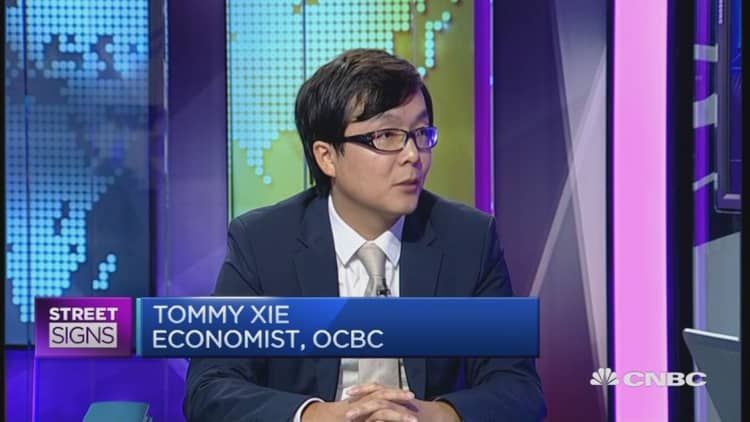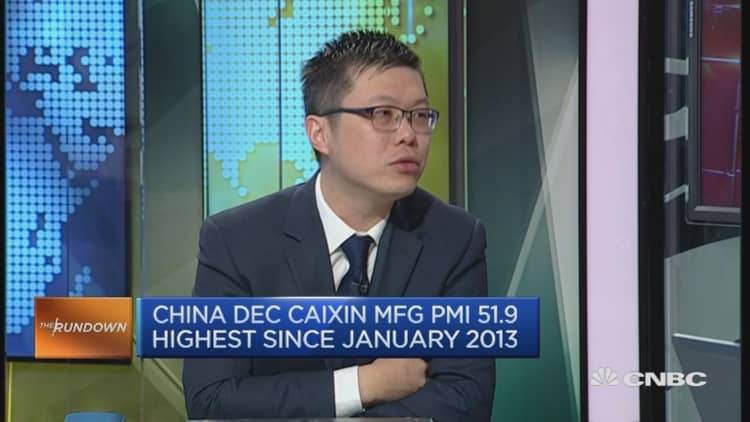Growth in China's services sector accelerated to a 17-month high in December, a private survey showed, adding to views that the world's second-largest economy is entering the new year with stronger momentum.
The strong pick-up mirrored improvements in manufacturing surveys earlier this week, as market watchers debate whether China's leaders will settle for a more modest growth target this year in order to focus on more pressing issues such as an explosive growth in debt.
The services PMI rose to 53.4 in December on a seasonally adjusted basis from 53.1 in November, the Markit/Caixin services purchasing managers' index (PMI) showed.
The December reading was the highest since July 2015, and well above the 50-mark that demarcates expansion in activity from contraction on a monthly basis.
New business for services firms also rose at the fastest pace in 17 months, while business expectations were at a 4-month high, though an employment sub-index remained stubbornly weak and input prices rose the fastest in nearly two years.

Companies surveyed said that higher raw materials prices were the biggest factor in higher prices, but strong competition meant they weren't able to pass along higher costs to customers, pointing to pressure on profit margins. An index of prices charged held basically stable at 50.5 in December.
"Improved rates of new order growth were also seen across both monitored sectors in December. The pace of new business expansion accelerated to its strongest since July 2014 at manufacturing companies ... At the same time, growth in new work at services companies quickened to a 17-month record," Caixin said in a release.
Caixin's composite PMI covering both the manufacturing and services sectors matched a near 4-year high of 53.5 in December from the previous month's 52.9, pointing to solid and more balanced growth for the economy overall.
The upbeat findings broadly echo those of official and private manufacturing surveys earlier this week that showed improving conditions across broad sectors of the economy.
"The Chinese economy performed better in the fourth quarter than in the previous three quarters," Zhengsheng Zhong, director of macroeconomic analysis at CEBM Group, said in a note with the report, adding that full-year growth was certain to meet the government's target of 6.5-7 percent.
China is slowly making progress in shifting its economic growth model away from a heavy reliance on exports and investment, with consumption contributing 71 percent of growth in the first nine months of 2016.
But auto sales are forecast to slow to single-digit growth this year, home sales are on a downward trend and even China's red-hot film industry grew only 3.7 percent last year.

Even as fears of an economic hard landing have greatly diminished, other risks have become more pronounced.
The foreign trade environment looks increasingly uncertain amid threats by U.S. President-elect Donald Trump to slap tariffs on China's shipments into its largest export market, and to brand Beijing a currency manipulator.
Credit is growing significantly faster than GDP and likely hit a record high last year, while speculation in housing, commodities and even government debt markets have raised the risks of asset bubbles as overall leverage in the economy is still rising.
These risks have led to expectations that financial and monetary conditions will be tighter this year, while pressure from a weakening yuan and capital outflows will also keep the focus on risk containment at the expense of growth.
"All known macroeconomic risks of China are still elevated. Persistent loss of foreign reserves, rising debt-to-GDP ratio, the risk of bubble burst in the property market, and the liquidity crunch in the domestic bond market etc will continue to work in unison to pressure economic growth lower," DBS said in a note on Wednesday.
"It is no coincidence that the leadership is reportedly to accept even slower growth this year."

